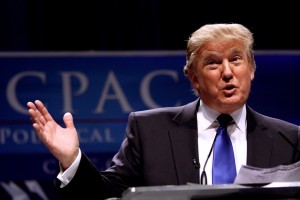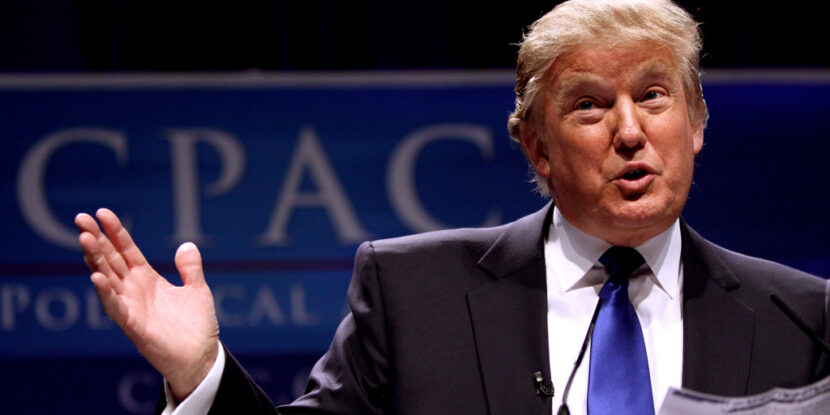
There have been two voices of reason amidst the hysteria in response to Donald Trump’s latest outburst. “Instead of debating the proposal in a reasoned way, the political class—both parties—and … the media are treating it as a thoughtcrime,” writes James Taranto. While there are, he notes, some good practical, policy and moral arguments to be made against Trump’s Muslim immigration proposal, the reaction of the establishment has been unhinged. The other GOP candidates who, rather than suggesting reasonable alternatives, are joining the hysteria by spouting the same P.C. bromides as The New York Times (“not who we are,” etc.) are making a big mistake. They’re leaving the field to Trump as the only candidate addressing the valid fears of the public. When a native-born Muslim-American and his Saudi bride dump their 6-month-old, and, in the name of Allah, mow down the co-workers who gave them a baby shower, we’ve got a big problem. We need to deal with it rather than giving condescending moral lectures to the American people. Hopefully, Trump won’t be the only candidate who gets this.
David French makes the even more important point that by saying outrageous things Trump is shifting the boundaries of the political debate that have been set by the P.C. left and is making it possible for others to say reasonable things. As I’ve argued previously, a main reason for the political-gravity-defying success of Trump’s candidacy is that he has given voice to the disgust with the growing tyranny of political correctness, which “is no longer just a sideshow one can joke about. Rather, … it has become, owing to the unprecedented dominance of the cultural left and their increasing intolerance of any disagreement, a very serious threat to the [classical] liberal values … that underlie modern Western civilization.”
The reality of this threat has come into sharp relief since then with the chillingly anti-democratic eruptions at Yale, the University of Missouri and other colleges. A Mizzou communications professor, her face contorted in Robespierrean rage, shrieks for “some muscle over here” to assault a reporter taking pictures. “Amherst Uprising” demands that students who put up “All Lives Matter” and “Free Speech” posters be “required to attend extensive training for racial and cultural competency.” The Claremont McKenna junior class president, after being photographed with two students in Mexican costumes (she was not wearing one herself), resigns in a Maoist confessional email asking those defending her to stop and to “learn from my mistakes in order to best help me create a safe environment for everyone.” Back at Mizzou, the university police department asks students to “call the police immediately” (emphasis theirs) to report “hurtful speech” so that the college can “take disciplinary action.”
These are not just the isolated actions of an outlier fringe. A Pew Research poll found that 40 percent of millennials support banning speech offensive to minorities. Professor Alan Dershowitz, a man not given to either conservatism or gratuitous analogies to the 1930’s, warns that “the fog of fascism is descending quickly over many American universities.” And the danger is not restricted to the campuses. As we saw with the forced resignation of Brandon Eich from Mozilla last year, corporate America is just a few steps behind academia in its enforcement of political orthodoxy.
Trump has emerged as the first significant counterforce to this authoritarian political correctness. Until recently, I might have ended that sentence with “despite his offensiveness,” but I’ve come to think that the more fitting connecter is “because of his offensiveness.” By his very outrageousness, Trump blasts back open a political spectrum that the left is constantly contracting to a narrower and narrower range of acceptable opinions. In doing this, he creates space for those of us with more moderately incorrect views. Pre-Trump, conservatives like me who politely asked to express our opposition to affirmative action or gay marriage without jeopardizing our livelihoods could perhaps hope to be allowed to do so on alternate Tuesdays – for now.
If my views are the most extreme permissible on the spectrum, then the left’s attempt to marginalize, and eventually silence, these views as “extreme” becomes self-fulfilling. This dynamic of narrowing the spectrum plays out in the debate over political correctness itself. When dissident liberals like Dershowitz and Jonathan Chait denounce the assault on free speech, the most insidious responses are not those from the hard left condemning them, but those from other liberals that begin “I agree with you but …” These liberals see “both sides.” Can’t we split the difference? Thus the spectrum is constricted, and speech circumscribed. And then the process repeats itself, with the compromise as the new extreme to be negotiated away. Trump blows up this dynamic.
But isn’t he damaging the Republican and conservative brands by repelling potential supporters? Quite possibly, were he to be the nominee. But short of this, he is playing an extremely important political role that I never properly appreciated until recently. In my journey from left to right, I spent quite a few years as a Democratic Leadership Council-style “new Democrat” of the type who nominated Bill Clinton. We viewed ourselves as sophisticated political realists in contrast to the Al Sharptons and other extremists who were driving away voters. But the joke was on us. In the long run, Sharpton and other leftist demagogues have had more impact on public policy than Bill Clinton – as is illustrated by the current rush of Hillary Clinton and other Democrats to reject Bill’s moderate policies.
Trump is the Sharpton of the right, pushing back against the excesses of P.C. liberalism and making a real debate possible. Let’s thank him for that and get behind one of the candidates better equipped to have that debate.
Dennis Saffran is an attorney and writer based in Queens, New York, the former head of a center-right public-interest organization and Republican candidate for New York City Council in one of the city’s few competitive districts, whose work has appeared frequently in City Journal, The Federalist and other publications.


